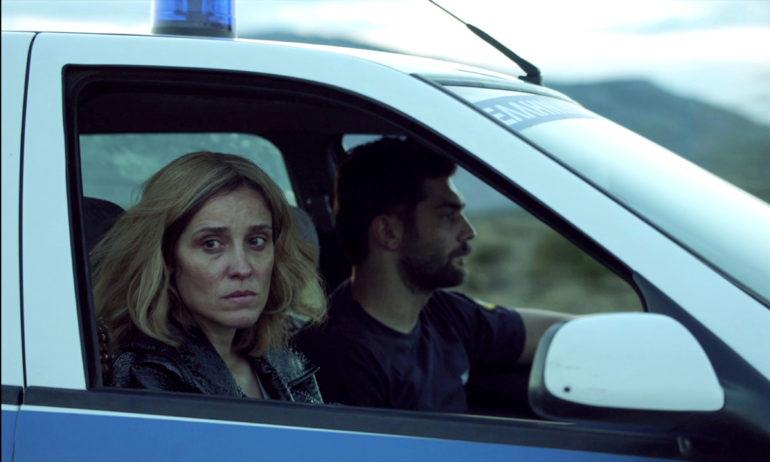Berlin Film Review: ‘The Miracle of the Sargasso Sea’
By Guy Lodge
LOS ANGELES (Variety.com) – “The Miracle of the Sargasso Sea” takes place far from the eponymous body of water, and in its actual swampy locale — a glum eel-fishing community in western Greece — miracles are in distinctly short supply. But the title’s metaphorical implications of disorientation and immurement are felt in a stylish, many-stranded mystery that often casts viewers adrift in clashing tides of dark genre convention, nightmarish surrealism and fevered close-up character study. Greek writer-director Syllas Tzoumerkas’ third feature unreels and obscurely entangles the stories of two unconnected women, a dissolute female police chief and an abused eel-factory worker, in murky depths of small-town sin. The fishy stew that results maintains the antic, scratchy energy of Tzoumerkas’s striking 2014 festival favorite “A Blast,” though overplotting muddles its impact.
“Sargasso Sea” is assured further festival play following its premiere in Berlin’s Panorama strand, though it’s a challenging sales prospect: Its commercial fortunes depend on how distributors play up its intriguing thriller aspects ahead of its more inscrutable storytelling. Tzoumerkas’ chaotic, high-pitched work doesn’t quite match the icy, eccentric austerity of the Greek “weird wave” that has now become its own arthouse brand. Rather, his latest invites comparisons to the loopier, trash-skirting genre outings of Herzog or Lynch, with the gradual unpeeling of layered madness and corruption in the sleepy working town of Missolonghi occasionally calling to mind an aggressively sunburned “Twin Peaks.” There’s certainly a full series’ worth of narrative to go round in the film’s two hours; it’s altogether as darting and slippery as the eels caught and processed by many of Missolonghi’s hapless residents.
One element of the film unlikely to go over anyone’s head is the forceful presence of star Angeliki Papoulia, who’s on fine, furious form in her first big-screen role since Yorgos Lanthimos’ “The Lobster” in 2015. As in “A Blast,” she matches the film’s busy scripting with her own bustling set of mannerisms, well suited to her hot-and-cold mess of a character: Elisabeth, a onetime SWAT officer introduced after a high-stakes bust in Athens that results in her getting summarily dispatched to Missolonghi. (The transfer is ostensibly for her safety, though the whiff of gender discrimination is strong.) Cut to a decade later, and demotion to backwater-cop duties has taken its toll on Elisabeth, now a low-functioning, bottle-blonde alcoholic who thinks nothing of sampling confiscated cocaine while on the job. Her teenage son Dimitris (Christian Culdiba) actively resents her for uprooting their lives; even her limited social circle regards her with distaste.
Still, she’s arguably better off than Rita (Youla Boudali, also the film’s co-writer), a downtrodden, God-fearing local whose job — grimly slaughtering eels at a plant — is somehow not quite as joyless as her home life, with its routine of constant emotional abuse by her brother Manolis (Christos Passalis), a sleazy-to-the-max singer at the local disco. When a dead body shows up in suspicious circumstances, the erratic paths of Elisabeth and Rita cross, yet while the ensuing investigation (and even its outcome) may seem straightforward, Tzoumerkas and Boudali crowd it with enough flailing subplots to make practically every person in the town an individual detective case. Elisabeth’s sometime lover Vassilis (Argyris Xafis), the married town doctor, complicates matters, as do the unseemly doings of local prosecutor Andreas (Laertis Malkotsis) and his mute brother Michalis (Thanasis Dovris) — to say nothing of the film’s sporadic, disconcerting biblical hallucinations that may be manifestations of Rita’s psychic pain, but are perhaps tied to less explicable flashbacks.
In this particular sea, then, red herrings and eels swim thick, fast and side by side. The performances of Papoulia and Badouli provide an anchor of ragged human feeling amid all the churning, soupy melodramatics, while the scorched, desolate atmosphere is as consistently imposing as the story is wildly intemperate. Swedish cinematographer Petrus Sjövik brings a kind of composed, Scandi-crime severity to proceedings, even while painting in the bilious yellows and silty browns of the parched Greek landscape: The sense throughout that we’re viewing Missolonghi through a wary outsider’s eyes is appropriate, considering how stubbornly Elisabeth has refused to make it her home: “The Miracle of the Sargasso Sea” is sympathetic to her unruly, unreliable perspective, even as Tzoumerkas marks it with hazard lights.

